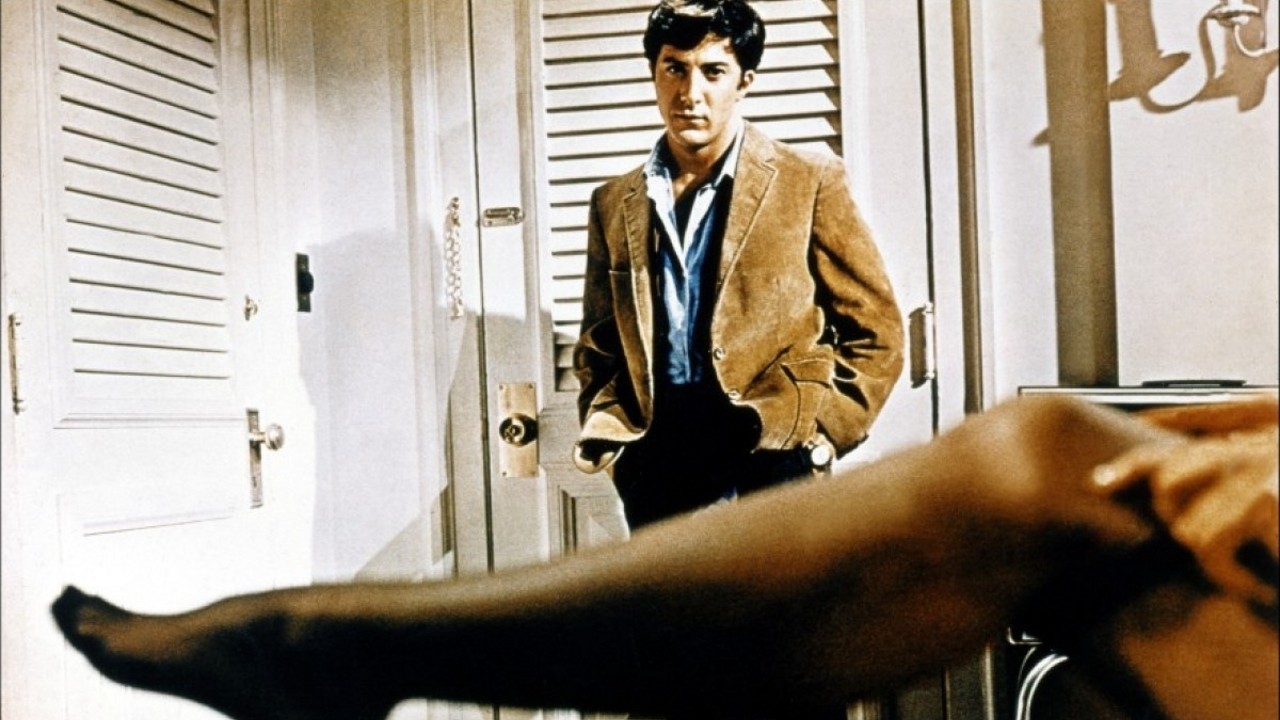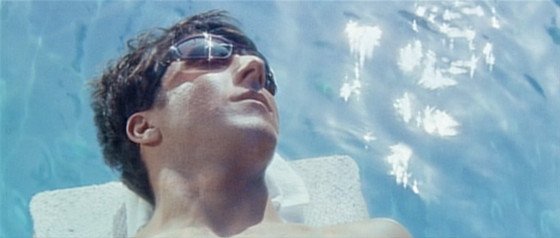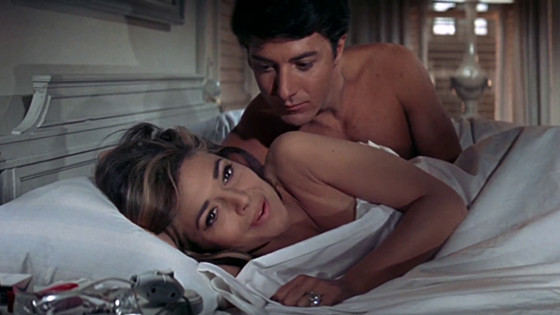
“Any good movie is filled with secrets.”
– Mike Nichols
Daydream nation
So much of the comedy in Mike Nichols’ zeitgeist-defining second film The Graduate, feels effortless and equipped with an intellectual exactitude. When it opened in 1967 it was the sort of film that audiences found to be forward, fearless, and even a little––okay a lot––lurid.
It was extremely uncommon that a high-profile Hollywood picture such as this take on such an equitable view on sex in suburbia let alone fixating upon a dubiously erotic triangle: a blasé college grad (Dustin Hoffman), a horny alcoholic housewife (Anne Bancroft), and her ingenue daughter (Katharine Ross)––oblivious to her mother’s voracious sexual appetite.
Deliberately aimed to tap into and indeed exploit the youth culture with its iconic soundtrack (Simon and Garfunkel’s newly minted “Mrs. Robinson” along with familiar hits like “The Sounds of Silence,” and “Scarborough Fair/Canticle”), frank delineation of sexuality, and unconventional drollery set a trend and something of a template for youth movies to follow forever after.
What are you going to do now?

Having already made a huge splash with his directorial debut from 1966, Who’s Afraid of Virginia Woolf?––adapted from Edward Albee’s celebrated 1962 play––Nichols saw in The Graduate a ripe opportunity to again combine his knack for acerbic accessory and quick-witted communication.
Nichols had previously already cut his comedy teeth with his improv partner Elaine May, together they had a renowned comedy duo in the 50s known as “Nichols and May” who wowed them on Broadway and over the course of their brief career released three comedy albums, one of which won a Grammy Award.
This celebrated run helped Nichols to understand the tenor and tone of the urban landscape and help him to delineate and ensnare the interests and sensibilities of teens and twentysomethings who would best identify with The Graduate and help make it a huge hit.
“Mrs. Robinson –– you are trying to seduce me … Aren’t you?”
– Benjamin Braddock (played by Dustin Hoffman)
Coo-coo-ca-choo Mrs. Robinson

As Benjamin Braddock, recently returned graduate of Williams College, Dustin Hoffman became a star, and while much of his inattentive attitude had a creepy undercurrent, the hazy and shapeless trembles of his parents’ frivolous materialism made him all the more relatable. His unabashed awkwardness and tic-addled affectation certainly contributed to The Graduate’s lasting allure.
A film brimming with wonderful moments and mythic flashes, perhaps it’s Mrs. Robinson (Anne Bancroft, wonderful) and her lustful advances that people remember the most. Essentially bullying her way into Ben’s britches, Hoffman displays what The New Yorker described as being “…almost Harold Lloyd-like in its portrayal of courage barely conquering fear of the unknown.”
Then there’s an earlier scene that also spoke directly to the mass cult when Ben attends a family friend’s silly but serious one-word cure all for prosperity; ”Plastics!” Fittingly, Ben acknowledges this remark with a combination of understated bewilderment, disgust, and panic.
The exploding plastic inevitable

The Graduate was written by Buck Henry (who cameos in the film as a hotel clerk) and Calder Willingham, based off of Charles Webb’s 1963 novella of the same name, and the pair received an Academy Award nomination for their efforts. In fact, The Graduate was very well liked by the Academy, who bestowed a total of six nominations––Nichols would win the Oscar for Best Director.
The Graduate ends in such a way as to upset the conventional happy ending. Benjamin heroically stops Elaine (Ross) from marrying the wrong man, and together they make their escape on a unromantic bus. And yet it’s an unsettling and problematic denouement, even if the gestures behave with grandiloquence.
Together the young couple lurch ahead towards uncertainty and reclusion. One can read a lot into the pair as they beat their hasty retreat and the camera seems to linger a little longer than is comfortable. There is a palpable and proper sound of silence between them, and a pessimism that cannot be avoided or discounted. Where are they going? Are they already disinterested with one another?
Absurdist, vicious, uncomfortable, and uproarious, coming-of-age stories were reinvented, kneaded with discomforted melancholy and made anew with The Graduate. Uncomfortable, acid-tinged, and perhaps bleaker than you remember it to be, fifty years on this is still a film that feels as modern as it does enchanting. A cowering classic.
Author Bio: Shane Scott-Travis is a film critic, screenwriter, comic book author/illustrator and cineaste. Currently residing in Vancouver, Canada, Shane can often be found at the cinema, the dog park, or off in a corner someplace, paraphrasing Groucho Marx. Follow Shane on Twitter @ShaneScottravis.